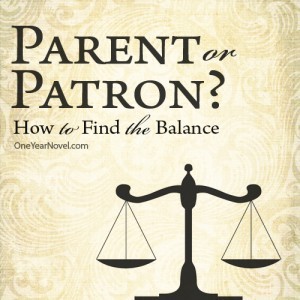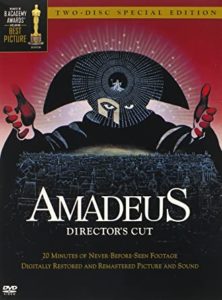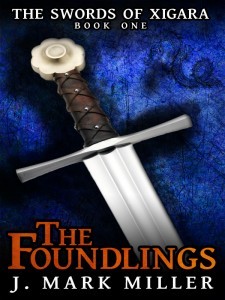Parent or Patron? – How to Find the Balance
Guest post by Jeff Miller
This week we get to hear from a writer who is also dad to a young writer who uses The One Year Adventure Novel:
 Today’s young writers face so many distractions and pressures. No matter their age, they deal with not only their everyday responsibilities, but also a sometimes overwhelming array of distractions constantly vying for their attention. As their parents, it is part of our responsibility to help our children find balance, learn self-discipline, and instill a good work ethic. But how do we do this?
Today’s young writers face so many distractions and pressures. No matter their age, they deal with not only their everyday responsibilities, but also a sometimes overwhelming array of distractions constantly vying for their attention. As their parents, it is part of our responsibility to help our children find balance, learn self-discipline, and instill a good work ethic. But how do we do this?
I am a parent and a writer, and I know the fight against distraction intimately. Even as I readily agreed to write up this second guest post, I thought, “Can I pull it off?” You see, like most other writers, my time and attention are sometimes spread a bit thin.
I don’t say this to publicly bemoan my situation. On the contrary, I’m happier and more fulfilled with life than at any other time. The reason I bring it up is, well, that’s how life goes. I am constantly learning to navigate this sea of distraction, both as a writer and as the parent of a writer.
Good navigating comes down to striking the balance between being our child’s parent and their patron.
Have you ever seen the movie Amadeus? Though not a completely accurate portrayal of Wolfgang Amadeus Mozart, it’s an interesting study of human nature and artistic genius.
Mozart makes his first appearance on screen under the patronage of the Prince-Archbishop of Salzburg. His amazing talent is evident, as well as his less-than-savory character. He’s soon revealed to be prideful and petulant—a man-child who has yet to grow up; and it seems as if he never will. His antics leave the movie’s other main character, Antonio Salieri, wondering why God would choose to bestow such gifts upon a soused popinjay.
 We learn that Mozart is in reality a tortured soul. When his father, Leopold, dies, Mozart is not only consumed with grief, but also haunted by his father’s specter. Leopold was a harsh taskmaster, a strict disciplinarian who drove Mozart to excel no matter the cost.
We learn that Mozart is in reality a tortured soul. When his father, Leopold, dies, Mozart is not only consumed with grief, but also haunted by his father’s specter. Leopold was a harsh taskmaster, a strict disciplinarian who drove Mozart to excel no matter the cost.
The remainder of the movie portrays a life spiraling out of control. Mozart’s finances are in shambles, his marriage is in turmoil, and his health is broken. In the end, Mozart dies, a victim of his own choices, and is buried in a pauper’s grave.
What was to blame for Mozart’s destruction? Surely, he made his own choices; but a study of his life as portrayed in the movie suggests some answers.
Though Mozart was an adult by the time he appears on screen, he thinks and acts like a spoiled child. It seems that many of his self-destructive behaviors stemmed from rebellion toward his overbearing father. In turn, there is also an element of indulgence not only on the part of Mozart himself, but also from the authority figures in his life. Perhaps, just perhaps, if his father had been more of a patron, and his patrons more like a father, Mozart might have lived a longer and less tragic life.
I’m sure almost every parent struggles to keep the balance between nurture and discipline. None of us intentionally set out to raise either a spoiled brat or a mindless automaton. When it comes to having a child passionately involved in something we may not personally grasp—such as writing—the struggle to know how to be both parent and patron is all the more difficult.
Here are a few suggestions from the viewpoint of someone who is both a writer and the parent of a writer to help you successfully wear both hats.
- Help them learn self-discipline in all areas of their life, not only in their schoolwork and chores, but also in their writing endeavors. Teach them how to manage their time well and establish routines. If possible, get their days organized in such a manner that they can attempt to get alone in their quiet place and write at the same time every day. Insist that they still manage their responsibilities. Writing time shouldn’t take precedence over incomplete schoolwork or unfinished chores.
- Once you’ve helped your writer find discipline and establish routines, protect their writing time. Do your best to see that they remain undisturbed when they spend time writing and creating. This may even mean becoming more parent than patron at times by insisting that they spend their customary time writing instead of doing something else that might be momentarily more attractive.
- Teach your writer the concept of opportunity cost—the loss of potential gain from one alternative when another alternative is chosen instead. Time is both valuable and limited, but sometimes we fail to grasp that reality until after the fact. How many times do we find ourselves disappointed that we spent our time on less profitable ventures? Help them see that time stolen from their writing is time they cannot get back.
- Invest real money into your writer’s dream. Many of you are already doing this by purchasing The One Year Adventure Novel and attending the workshops. Consider doing even more, especially if your writer shows both a real talent, and a genuine interest in writing beyond a hobby. Become a patron in truth. Purchase a computer and dedicated writing software, such as Scrivener. Invest in their environment with good lighting, a proper desk and chair, or a nice lap desk. If your writer listens to music while they write, buy them a quality collection from iTunes or another online retailer, and maybe get them some high-quality noise-canceling headphones.
- Feed your writer’s book habit. You know your writer has a long list of books they’d love to read. Consider starting a book fund and regularly refresh their reading choices—both fiction and non-fiction. Use it as a tool to encourage them to read outside their preferred genres and challenge them to find and apply practical knowledge to their growing craft.
Fellow parents, I encourage you to join me in embracing the struggle of balancing parenthood with patronage—especially as our young writers get older and grow more intentional about their craft. Not only will we be helping them achieve their writing goals, but we’ll also be setting the stage of our relationship with them as they grow into adulthood.
…
Let’s hear from the young writers out there. What are some suggestions you have for your parents—and other patrons in your life—that would be of true and lasting benefit to your writing endeavors?
…
Jeff Miller is a retired minister, and a writer, musician, blogger, graphic designer, and something of a self-taught self-publishing guru. His first novel, a fantasy adventure entitled The Foundlings, is available now on Amazon. Jeff and his family of OYANers live in North Texas, along with several Apple products.
Another post from Jeff: Why Young Writers Need Community »
Read more of Jeff’s tips and reflections on the writing journey on his blog, “A Writer’s Fantasy” »




